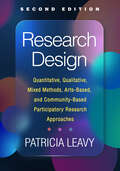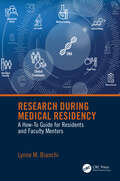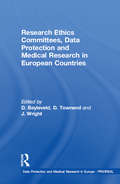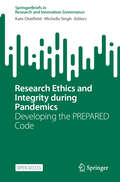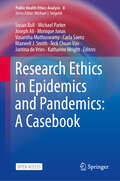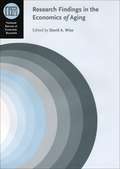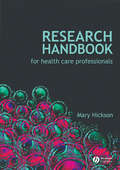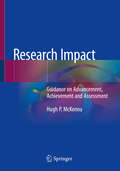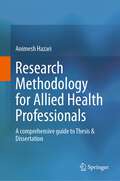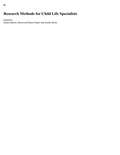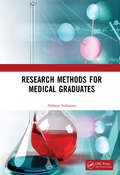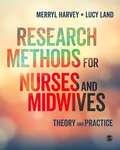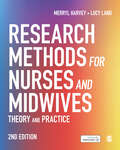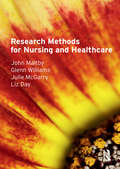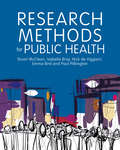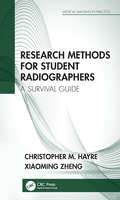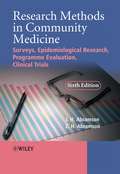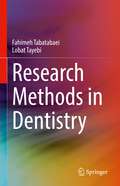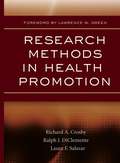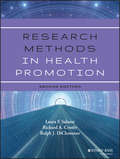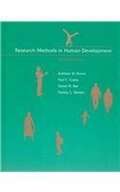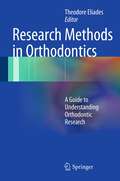- Table View
- List View
Research Design: Quantitative, Qualitative, Mixed Methods, Arts-Based, and Community-Based Participatory Research Approaches
by Patricia LeavyWith a new chapter on the literature review, this accessible step-by-step guide to using the five major approaches to research design is now in a thoroughly revised second edition. The prior edition's user-friendly features are augmented by a new companion website with worksheets keyed to each chapter. For each approach, the text presents a template for a research proposal and explains how to conceptualize and fill in every section. Interdisciplinary research examples draw on current events and social justice issues. Unique coverage includes hot topics--replication studies, data sharing, and preregistration; tailoring proposals to different audiences; and more. Terminology commonly used in each approach is identified and key moments of ethical decision making are flagged. The book includes a general introduction to social research, an in-depth discussion of ethics, and a chapter on how to begin a research study. New to This Edition *New or expanded discussions of theory and literature in quantitative research, replication studies, preregistration of research, the critical paradigm in qualitative research, mixed methods research, approaching different kinds of organizations in community-based participatory research, and more. *Chapter on the literature review, including the ethics of citational practices. *Companion website with worksheets to aid in learning and practicing each chapter's key concepts. *Updated examples, references, and recommended readings throughout. Pedagogical Features *Multiple "Review Stops" in each chapter--quick quizzes with answer keys. *End-of-chapter writing exercises, research activities, and suggested resources. *Bolded key terms and an end-of-book glossary. *Boxed tips from experts in the respective approaches. *Pointers to downloadable worksheets throughout the chapters. *Author-created PowerPoints and chapter tests with answer keys available to instructors using the book in a course.
Research During Medical Residency: A How to Guide for Residents and Faculty Mentors
by Lynne M. BianchiThis book is a guide for medical residents and faculty in the fundamentals of clinical research, publication practices, and conference skills. It offers advice on how to incorporate scholarly activities into training routines, so the process becomes more manageable and less burdensome. Suggestions for pursuing other scholarly activities, outside of clinical research, are also offered. Participation in research and other scholarly activities is a requirement for graduation from medical residency programs in the United States and many other countries. Faculty physicians who train residents are also required to produce annual scholarly work. Adding scholarship onto an already long list of requirements often feels a bit daunting to medical residents and the faculty who teach them. Fortunately, there are many forms of scholarly activity, including basic and clinical research, quality improvement projects, and educational assessments, so everyone can find interesting and feasible projects to complete. This valuable reference provides users with a reliable source to turn to whenever they have questions on how to develop, conduct, publish, or present a research project. Written with the perspective of busy faculty and residents in mind, the content balances the need for enough detail to be instructive with the need for quick access to key points.
Research Ethics Committees, Data Protection and Medical Research in European Countries (Data Protection and Medical Research in Europe : PRIVIREAL)
by D. TownendThe Data Protection and Medical Research in Europe: PRIVIREAL series represents the results of this EC-funded project examining the implementation of Directive 95/46/EC on data protection in relation to medical research and the role of ethics committees in European countries. The series consists of five separate volumes following the complete development of the PRIVIREAL project. This volume relates to the second stage of this project and is concerned with the setting up and role of research ethics committees. It assesses their legal responsibilities, especially with regard to data protection matters and contains reports from more than 20 European countries on these issues. Focusing on the theoretical role and practical operation of research ethics committees and the impact of relevant international and national instruments, this volume will be an essential resource for all those concerned with data protection issues in medical research.
Research Ethics and Integrity During Pandemics: Developing the PREPARED Code (SpringerBriefs in Research and Innovation Governance)
by Kate Chatfield Michelle SinghThis open-access book is an essential read for anyone interested in pandemic preparedness, research governance, and the ethical oversight of research. It examines the development of a pioneering research ethics framework designed for use during pandemics, guiding readers through the careful development of the PREPARED Code, while highlighting the key steps and lessons learned. The book also underscores the importance of supportive measures, such as user-friendly ethics training, to ensure effective implementation. Drawing from these insights, it offers recommendations for others seeking to develop their own clear, engaging, and accessible ethics code.
Research Ethics in Epidemics and Pandemics: A Casebook (Public Health Ethics Analysis #8)
by Michael Parker Susan Bull Carla Saenz Vasantha Muthuswamy Joseph Ali Monique Jonas Maxwell J. Smith Teck Chuan Voo Jantina De Vries Katharine WrightThis open access casebook addresses complex and important ethical challenges arising when health-related research in conducted in the context of epidemics and pandemics. This book provides contextually-rich real-world case studies illustrating research ethics issues encountered by researchers, ethics reviewers and regulators around the globe during the COVID-19 pandemic. The accompanying commentaries outline relevant conceptual approaches and ethical considerations. These promote understanding and reflection on relevant ethical issues, ethical approaches and competing considerations in a manner supporting thoughtful evaluation of their implications for practice. As such the casebook is relevant to academic and professional audiences with an interest in global health, research ethics, and outbreaks and epidemics.
Research Findings in the Economics of Aging
by David A. WiseThe social and economic effects of this shift are significant, and in Research Findings in the Economics of Aging, a group of leading researchers takes an eclectic view of the subject. Among the broad topics discussed are work and retirement behavior, disability, and their relationship to the structure of retirement and disability policies.
Research Handbook for Health Care Professionals
by Mary HicksonThe Research Handbook for Health Care Professionals is the essential guide to the entire research process for students and practitioners alike. From conceiving an idea for a project to writing up the findings for publication, the book offers an overview of each stage plus hints and tips, recommendations for further reading and examples spanning a wide range of health professions. The book comprises three sections: Getting Started, Doing Your Research and Writing Up and Dissemination, and includes chapters on key topics such as formulating your research question, writing the initial research protocol, application for ethical approval, research governance, collecting your data, research methods and preparing a poster for a conference.
Research Impact: Guidance on Advancement, Achievement and Assessment
by Hugh P. McKennaResearch for research sake is no longer tenable or affordable; to be valuable to society, research must have impact! This textbook takes the reader on a journey from how the UK Research Excellence Framework assesses impact to real examples of outstanding research impact case studies. Along the way, Prof. Hugh McKenna describes and explains the case for research impact, the challenges, the link between research impact and evidence informed practice, achieving impact through changing policy and engaging with the public, how researchers can make their research findings more impactful and how research impact is assessment nationally and internationallyIt is written in an easily accessible and understandable style, with reflective exercises amply distributed throughout its pages and helpful guides helping to engage readers and notably health professionals who are often turned off by the normal heavy research tomes. This book makes the complex simple and the wearisome fascinating. The short chapters are interesting and authoritative and can be read on a ‘standalone’ basis, allowing readers to ‘dip in and out’.From his experience in various countries, the author has a unique insight into what research impact is, how it is assessed and how and where research findings can have the most benefit. The stimulus for this book has been the excellent feedback that the author has received from health professionals, students and fellow researchers. There is always a risk that good knowledge and experience do not transfer well into a good textbook. In Research Impact: Guidance on Advancement, Achievement and Assessment, nothing has been lost in the transition. The book will be of great interest to many health researchers from nursing to midwifery, pharmacy, medicine or any allied health professional, but also to any research manager in all professions who want their research to bring positive change to society, culture, the economy, health and quality of life. It will be of particular interest to those who want to understand the difference between research impacts that are weak and those that are outstanding and how such assessments are made.
Research Methodology for Allied Health Professionals: A comprehensive guide to Thesis & Dissertation
by Animesh HazariResearch Methodology is one of the essential subjects for Master's and Ph.D. students, which requires a comprehensive understanding of the subjects with their scientific application. This book would target all aspects, including detailed information on components of research methodology, to enable readers to conduct and write their research work. Thus, the book covers a larger audience in the allied health stream, focusing on university students and Ph.D. scholars. The language of the book is simple and lucid, with multiple illustrations for easy understanding. Ultimately the book would aim to prepare competitive health professionals to render the highest quality of research work and enable them to transform it into their clinical practice. With years of vast experience and research output, the project will have a great success and fruitful outcome.
Research Methods for Child Life Specialists
by Sarah Daniels Sherwood Burns-Nader Jessika BolesIn todays evidence-based healthcare culture, child life specialists must demonstrate knowledge and skill not only in clinical care, but also in planning and evaluating the impact of their interventionsyet few resources exist to provide research skills and support for these practitioners. To adequately evaluate, improve, and innovate patient and family outcomes, it is essential that all providers understand the key inquiry pathways of research. <p><p>Combining clinical examples and skills with candid advice from seasoned child life specialist researchers, this text scaffolds the concept of inquiry into feasible units of action. From identifying a clinical question to assembling a team, designing a project, collecting and analyzing data, and reporting on results, it guides students, professionals, and administrators in actively exploring and improving healthcare outcomes for patients and their families. <p><p>Case examples from the authors own experiences as clinicians and researchers serve to demonstrate how to seamlessly translate clinical skills into those needed for success in research, ensuring that child life specialists remain active contributors to todays research evidence on the needs of children and families during healthcare encounters.
Research Methods for Medical Graduates
by Abhaya IndrayanThis book discusses the why and how of each step of data-based medical research that can provide basic information to emerging researchers and medical graduate students who write theses or publish articles. The chapters are arranged in the sequence of steps for data-based research. The research steps are comprehensively covered from the selection of the topic to the final publication. Reporting methods such as CONSORT, STARD, and SAMPL guidelines are also covered. Each chapter has separately earmarked examples from the contemporary literature that illustrate the different research methods. Key Features Discusses all the steps of data-based medical research Examines the topics in depth by way of examples from contemporary literature Features notable information in boxes for special attention .
Research Methods for Nurses and Midwives: Theory and Practice
by Dr Merryl Harvey Lucy LandThis book is the only research methods book you need to succeed whilst studying nursing and midwifery. Ideal for all pre and beyond registration nurses, this book has everything you need to know about consuming, critiquing and using research; it then builds on this foundation to develop these ideas into workable practice for real-world research. Inspired by over 25 years combined experience, the authors have structured the book around the complimentary spheres of theory and practice and take you through each step of the research process, demonstrating how to choose a question, design your research proposal, collect data, analyse your findings and write up your research. It explores: · Evidence-based research · Literature and systematic reviews · Ethics · Secondary Data · Research design · Methodologies and individual methods · Data analysis – quantitative and qualitative Interwoven with case studies and embracing quantitative, qualitative and mixed methods alike, this balanced textbook provides an introduction to a wide range of theories and methods and is packed full of material specially created to meet student and instructor needs. Whether you are new to research methods or returning to formal education and hoping to conduct your own research, this book is your ideal companion.
Research Methods for Nurses and Midwives: Theory and Practice
by Dr Merryl Harvey Lucy LandThis book is the only research methods book you need to succeed whilst studying nursing and midwifery. Ideal for all pre and beyond registration nurses, this book has everything you need to know about consuming, critiquing and using research; it then builds on this foundation to develop these ideas into workable practice for real-world research. Inspired by over 25 years combined experience, the authors have structured the book around the complimentary spheres of theory and practice and take you through each step of the research process, demonstrating how to choose a question, design your research proposal, collect data, analyse your findings and write up your research. It explores: · Evidence-based research · Literature and systematic reviews · Ethics · Secondary Data · Research design · Methodologies and individual methods · Data analysis - quantitative and qualitative Interwoven with case studies and embracing quantitative, qualitative and mixed methods alike, this balanced textbook provides an introduction to a wide range of theories and methods and is packed full of material specially created to meet student and instructor needs. Whether you are new to research methods or returning to formal education and hoping to conduct your own research, this book is your ideal companion.
Research Methods for Nurses and Midwives: Theory and Practice
by Lucy Land Merryl HarveyThis book walks you step-by-step through the whole research process so you can get up to speed understanding and doing your own research. In their friendly, down to earth style, the authors lay the theoretical foundations you need to consume and critique research, before showing how to translate this into action when tackling your own literature review or research project. This second edition: Draws on a wealth of examples from midwifery, four fields of nursing including mental health nursing and child nursing, and a range of health care specialities. Covers new and updated NMC professional education standards and maps all relevant policy and law. Supports your learning with reflective exercises, online activities and quizzes that enable you to be confident in your understanding and develop your thinking. Whether you’re encountering research and evidence-based practice for the first time or refreshing your methods knowledge, this is the ideal research companion for nurses and midwives pre-registration, post-registration and beyond.
Research Methods for Nurses and Midwives: Theory and Practice
by Lucy Land Merryl HarveyThis book walks you step-by-step through the whole research process so you can get up to speed understanding and doing your own research. In their friendly, down to earth style, the authors lay the theoretical foundations you need to consume and critique research, before showing how to translate this into action when tackling your own literature review or research project. This second edition: Draws on a wealth of examples from midwifery, four fields of nursing including mental health nursing and child nursing, and a range of health care specialities. Covers new and updated NMC professional education standards and maps all relevant policy and law. Supports your learning with reflective exercises, online activities and quizzes that enable you to be confident in your understanding and develop your thinking. Whether you’re encountering research and evidence-based practice for the first time or refreshing your methods knowledge, this is the ideal research companion for nurses and midwives pre-registration, post-registration and beyond.
Research Methods for Nursing and Healthcare
by John Maltby Liz Day Glenn Williams Julie McgarryResearch Methods for Nursing and Healthcare is an essential introductory text for all nursing and healthcare students coming to research methods for the first time or those nurses and healthcare staff wishing to improve their skills in this area. The book includes comprehensive coverage of the main research methods topics, and provides guidance on how to understand and apply research techniques. Everyday nursing examples are used throughout to explain research methods concepts and their relevance to practice. Simple self-assessment tasks are included at the end of chapters; the tests can be undertaken individually, or within groups, to assess the student's understanding of the concepts and skills being learnt. Research Methods for Nursing and Healthcare takes the fear out of research methods for all nursing and healthcare professionals.Excellent introductory text that brings interest to research methods for student nurses.Dr Aimee Aubeeluck, Deputy Director: Graduate Entry Nursing, School of Nursing, Midwifery and Physiotherapy University of Nottingham"I think this is one of the most readable books on research I have read. Not the most scholarly, but that was not the intention. It is certainly the most user friendly book that will make the whole, often scary, subject of research less threatening."Paula Crick, Principal Lecturer, Faculty of Health, Staffordshire University"I do think this is one of the most engaging texts aimed at nursing that I have read in a while... This does seem much more exciting and more importantly. 'real world'"Lucy Land, Senior Academic, Centre for Health and Social Care Research Faculty of Health Birmingham City University"Useful resource for our students dissertation which can be a literature review or a research proposal"Melanie Brooke-Read, Department of Health & Social Studies, University of Bedfordshire"Excellent text book which actually takes away the 'fear' of research within healthcare"Angela Cobbold, Institute of Health & Social Care, Anglia Ruskin University"The text is very comprehensive and I found chapter 7 on action research particularly useful in supporting a student I was supervising. I also like the self assessment exercises which I intend to incorporate in my teaching strategy."Ms. Mulcahy, School of Nursing and Midwifery, University College Cork.
Research Methods for Public Health
by Stuart McClean Paul Pilkington Isabelle Bray Nick de Viggiani Emma BirdResearch Methods for Public Health offers an in-depth introduction to the theories, concepts, approaches and practices, relevant to research methods in a public health setting. Informed by a socio-ecological model of public health, the book uses real world research examples and contemporary social, political and environmental themes of public health that reflect UK and international contexts. The book provides a straightforward approach to developing a research project and applying methods in practical and realistic ways, using an innovative, integrative approach that combines methodologies. The authors have moved away from traditional approaches to research methods, and include chapters on primary quantitative, qualitative and mixed methods research, evidence synthesis approaches, critical appraisal, research governance and ethics, and dissemination. Essential reading for postgraduate students, researchers and public health practitioners, or individuals preparing for the UK Faculty of Public Health Part A examination.
Research Methods for Public Health
by Stuart McClean Paul Pilkington Isabelle Bray Nick de Viggiani Emma BirdResearch Methods for Public Health offers an in-depth introduction to the theories, concepts, approaches and practices, relevant to research methods in a public health setting. Informed by a socio-ecological model of public health, the book uses real world research examples and contemporary social, political and environmental themes of public health that reflect UK and international contexts. The book provides a straightforward approach to developing a research project and applying methods in practical and realistic ways, using an innovative, integrative approach that combines methodologies. The authors have moved away from traditional approaches to research methods, and include chapters on primary quantitative, qualitative and mixed methods research, evidence synthesis approaches, critical appraisal, research governance and ethics, and dissemination. Essential reading for postgraduate students, researchers and public health practitioners, or individuals preparing for the UK Faculty of Public Health Part A examination.
Research Methods for Student Radiographers: A Survival Guide (Medical Imaging in Practice)
by Christopher M. Hayre Xiaoming ZhengThis book provides an holistic picture of the application of research in radiography and focuses on multivariant methodological approaches and practices. It will provide readers insight into both contemporary and innovative methods within radiography research, backed up with evidence-based literature. This book may also be translated into other health disciplines as it introduces research to the reader by detailing terms that can often be confusing for students. These remain central in understanding the importance of research in radiography and how the generation of new knowledge is obtained. This will be supported with subsequent chapters concerning the literature, formation of research questions and detail the early beginnings of a research proposal. Chapters will include a wide range of topics, such as quantitative and qualitative methodologies and data collection tools pertinent to radiographic research, whilst discussing data analysis and need for rigor. The authors draw from our experiences, published outputs and clinical work, supported with alternate philosophies and methods used in diagnostic radiography. Each chapter will examine the multifaceted use and application of each ‘sub-theme’ pertinent to research in radiography, which is presented in a single text for students and, perhaps, practitioners. The targeted audience for this book is interdisciplinary but clearly focuses on those studying undergraduate radiography in response to the limited texts available. We also anticipate it to provide a useful tool for academics delivering undergraduate radiography programmes and those supporting postgraduate research. The key features will: • explore important research approaches and concepts within diagnostic radiography • provide contemporary evidence-based practice regarding mixed method approaches • provide a ‘how to guide’ for understanding key research principles in a wide range of radiographic settings • evaluate the impact of research on patients and the radiographer–patient relationship Dr. Christopher Hayre is a Senior Lecturer in Diagnostic Radiography at Charles Sturt University in New South Wales, Australia. Dr. Xiaoming Zheng has been teaching medical radiation science courses at Charles Sturt University since 1998.
Research Methods in Community Medicine
by Z. H. Abramson Joseph AbramsonA simple and systematic guide to the planning and performance of investigations concerned with health and disease and with health careOffers researchers help in choosing a topic and to think about shaping objectives and ideas and to link these with the appropriate choice of methodFully updated with new sections on the use of the Web and computer programmes freely available in the planning, performance or analysis of studies
Research Methods in Dentistry
by Lobat Tayebi Fahimeh TabatabaeiThis classroom-tested textbook will assist dental students with their academic research activities and help them to be competitive in today’s fast-growing research environment. It is designed as a core text for dental school classes such as Research Methodology and Scientific and Technical Writing, as well as Responsible Conduct of Research (RCR) training, but will also be a valuable resource for students and researchers in related fields, such as the medical sciences and biomedical engineering. The authors start the book by explaining key concepts and common approaches in dental research, both in basic science and clinical dentistry. They then familiarize readers with evidence-based research in dentistry and how to write a systematic review, explain the process of designing and presenting a proposal, discuss reporting results both in scientific and clinical research, and cover ethics in research, highlighting the significance of adherence to ethics both in animal as well as human studies.
Research Methods in Health Promotion
by Richard A. Crosby Ralph J. Diclemente Laura F. SalazarResearch Methods in Health Promotion provides students (advanced undergraduate and graduate students) and practitioners with basic knowledge and skills regarding the design, implementation, analysis, and interpretation of research in the field of health promotion. Taking the perspective that research involves a predetermined series of well-defined steps, the book presents these steps in a sequential format.
Research Methods in Health Promotion
by Richard A. Crosby Laura F. Salazar Ralph J. DiClementeThe bestselling textbook to understanding health research, updated and expanded Research Methods in Health Promotion provides students and practitioners with essential knowledge and skills regarding the design, implementation, analysis, and interpretation of research in the field of health promotion. Now in its second edition, this bestselling textbook has been updated with more recent research methodologies and additional information on sampling, participatory and survey research, and qualitative data analysis. The entire research process is covered, with specific points relating to both qualitative and quantitative research. By breaking the daunting process of research into simple and well-defined steps, this user-friendly text encourages students to think about research as a sequential process and provides explanations that facilitate better understanding of each step in the research process. A separate set of chapters cover the more quantitative methodological areas including designs, measurement, sampling, and data analysis in depth, giving readers the understanding they need to apply in practice. This book also provides applied chapters that illustrate the practical aspects of the research process, along with other critical information including grant writing and scientific writing. Evaluate the ethics, design, analysis, and interpretation of research Identify and understand the key components of research studies Analyze and interpret the results of experimental and survey research designs Understand the process of publishing a research report and constructing a grant proposal Research Methods in Health Promotion is ideal for both undergrad and graduate methods courses in health promotion and public health.
Research Methods in Human Development
by Paul C. Cozby Kathleen Brown Daniel W. KeeThis introductory text is designed for applied research methods courses focused on human development. Accessible and clearly written, the text reflects an interdisciplinary, life-span approach as well as a complete balance between experimental and non-experimental methods.
Research Methods in Orthodontics
by Theodore EliadesThe orthodontic literature includes many articles on basic science and engineering research techniques, but clinicians are typically unfamiliar with the principles underlying these techniques and may also lack the background knowledge required for a full appreciation of their role. This book comprehensively reviews a wide array of the research methods most frequently encountered in the literature, encompassing the areas of materials science and clinical and biological research. The various methods and techniques are carefully described, and their indications and limitations are explained. All of the information is up to date, reflecting latest developments in the field. For practicing professionals, Research Methods in Orthodontics will be an ideal introduction to instrumental analysis and basic science research methods. It will also serve as an excellent reference guide for researchers.
